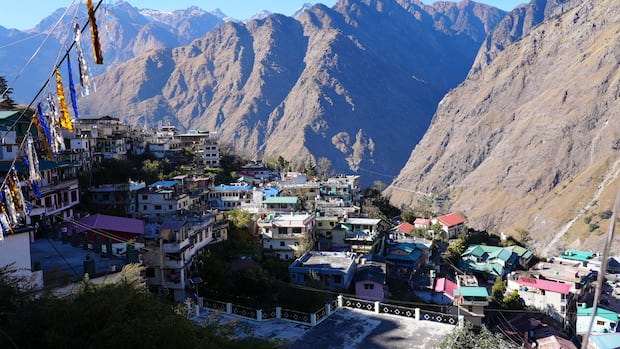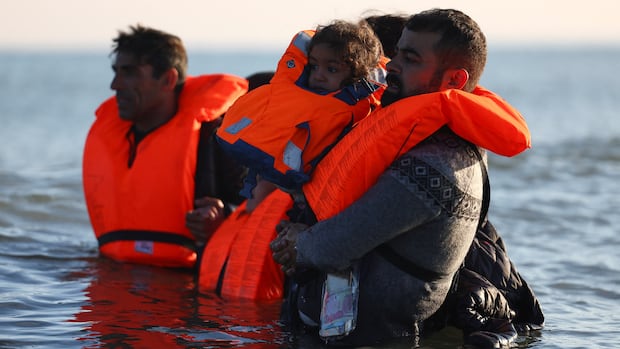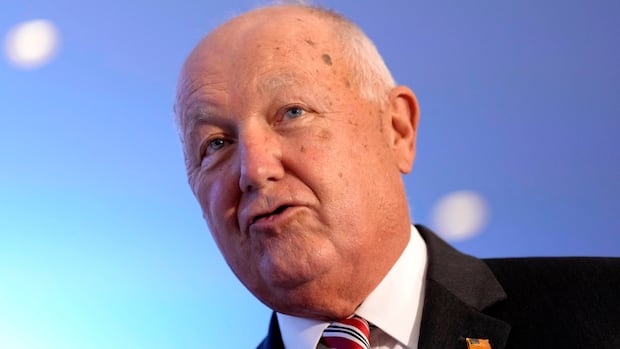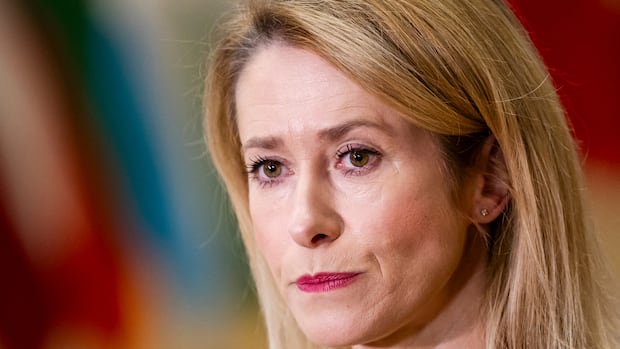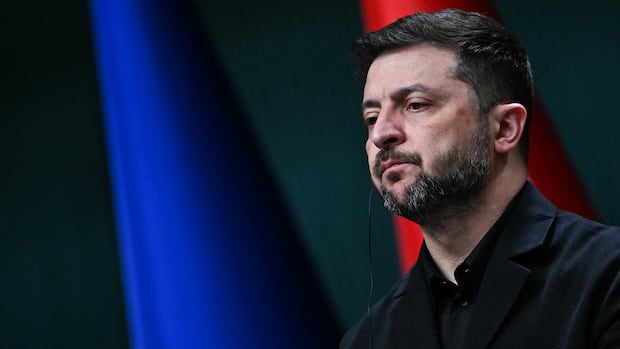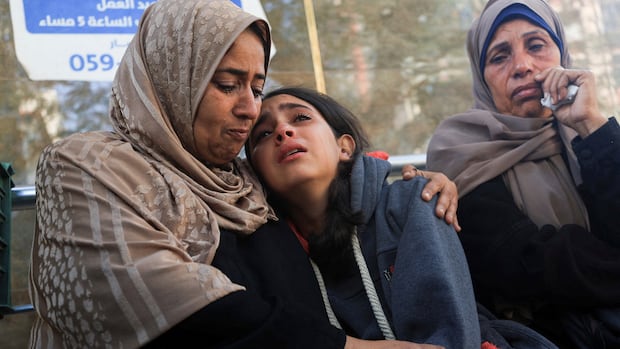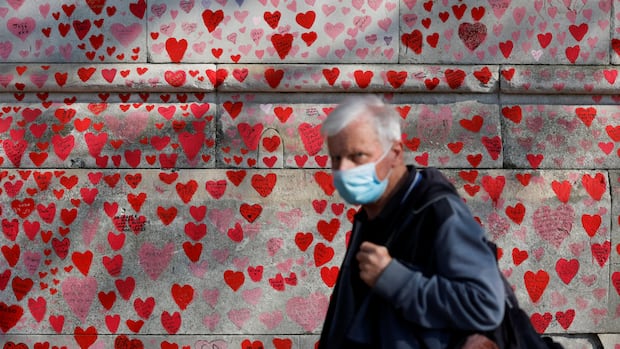Pete Hoekstra, the U.S. ambassador to Canada, sounded off again on Ontario's anti-tariff ad at the National Manufacturing Conference in Ottawa on Wednesday, continuing a trend of perhaps less-than-diplomatic comments in just six months on the job.
The Ontario government ad campaign featured clips of former U.S. president Ronald Reagan speaking negatively about tariffs, though it left out Reagan explaining he was making a temporary exception to his position, with Japan on trade. The ad backed by Premier Doug Ford ran nationally during the World Series, and Trump railed against it, breaking off trade deal talks, after making earlier comments that were more ambivalent.
"Targeting the president of the United States and his policies 10 days before an election, in a couple of weeks before a Supreme Court case would be heard … I'm sorry, that does not happen in the United States of America," said Hoekstra.
WATCH | Hoekstra says anti-tariff ad meddled in U.S. politics:U.S. Ambassador to Canada Pete Hoekstra said Canada inserted itself into American electoral politics with Ontario's anti-tariff ad that led U.S. President Donald Trump to cut off trade talks. 'You do not come into America and start running government-funded political ads and expect that there will be no consequences or reaction,' he said.It wasn't clear which specific elections Hoekstra was concerned about. The U.S. is in an off year in its nearly perpetual election cycle, with just a handful of races held paling in comparison to the hundreds of contests in midterm and presidential election years.
It is perhaps doubtful that voters in New Jersey and Virginia gubernatorial races were more affected by the Ontario ad — if they even paid attention to it — than planned data centres in their states that could hike energy bills, or, in the case of Virginia — home to CIA, FBI and Pentagon facilities — job losses from Trump's scythe-like cuts through the federal workforce.
Hoekstra later expressed optimism the two countries could eventually overcome the current challenges in the relationship but clearly resented what he viewed as a precedent-busting imposition from Canada.
Trump in his first presidential campaign welcomed hacking into rival Hillary Clinton's emails with his famous "Russia, if you're listening," entreaty, and the ensuing questions about contacts between his campaign and Russian officials dominated the political discourse for at least the following two years. The saga also gave rise to articles and segments, including on CBC, on the behind-the-scenes U.S. history with foreign election interference.
Trump has also departed from the precedent of previous presidents, by weighing in on electoral politics elsewhere or effecting policies ahead of votes. Here are some examples:
ArgentinaHoekstra's comments were particularly interesting given that Trump made arguably his most explicit intervention into a foreign election just last month, for politically aligned Javier Milei's Argentine administration.
The Trump administration, in the middle of a domestic government shutdown, agreed to shore up the Argentine peso in a $20 billion currency swap for U.S. dollars, as well as plotting more favourable tariff exemptions for some exports from the South American country.
 U.S. Treasury Secretary Scott Bessent presents an award to Argentine President Javier Milei at the Global Citizen Awards ceremony in New York on Sept. 24. In subsequent weeks, Bessent helped the Trump administration defend a series of moves to aid Argentina. (Stefan Jeremiah/The Associated Press)
U.S. Treasury Secretary Scott Bessent presents an award to Argentine President Javier Milei at the Global Citizen Awards ceremony in New York on Sept. 24. In subsequent weeks, Bessent helped the Trump administration defend a series of moves to aid Argentina. (Stefan Jeremiah/The Associated Press)The planned deals roiled some parts of Trump's MAGA base, and came after tumultuous months in which the U.S. pulled back from a wide range of foreign aid commitments, many of them global health initiatives.
Trump made it clear that that Argentina's late October midterm vote was a "very big election" being watched closely by the White House.
"He may not win, but I think he's going to win," said Trump. "And if he wins, we're staying with him."
Otherwise, Trump added, "we're not going to waste our time."
The election result was favourable to both sides, and the White House last week outlined a framework with Argentina on trade and other issues.
BrazilEven though he had vast political experience, Jair Bolsonaro was dubbed the "Trump of the Tropics" and "Brazil's Trump" after his party nominated him to run in the 2018 election. Bolsonaro survived a stabbing during that campaign and was a clearcut winner in the second round of elections.
Trump was a private citizen when he issued a pair of messages in successive months regarding Bolsonaro's re-election campaign in September and October 2022, though it was crystal clear he was about to announce his intention to run for U.S. president again, which he did in November.
 Eduardo Bolsonaro, son of Brazil's former President Jair Bolsonaro, takes the stage backdropped by a screen featuring his father Donald Trump, at the Conservative Political Action Conference in Buenos Aires, Argentina on Dec. 4, 2024. (Natacha Pisarenko/The Associated Press)
Eduardo Bolsonaro, son of Brazil's former President Jair Bolsonaro, takes the stage backdropped by a screen featuring his father Donald Trump, at the Conservative Political Action Conference in Buenos Aires, Argentina on Dec. 4, 2024. (Natacha Pisarenko/The Associated Press)"He is a wonderful man, and has my Complete & Total Endorsement!!!" Trump posted on Truth Social in September, followed by a plea the next month to not "let the Radical Left Lunatics & Maniacs destroy Brazil."
Bolsonaro lost to Luiz Inácio Lula da Silva, and, to many observers, made the comparisons to Trump more ironclad by scheming to find ways to prevent the peaceful transfer of power, as his American friend did a year earlier.
BritainTrump as a presidential candidate in 2016 often weighed in on Britain's vote on severing ties with the European Union, but it was in 2019 as president when he really couldn't stop talking about U.K. political affairs. During the spring-summer Conservative leadership race to succeed Teresa May, Trump couldn't stop raving about Boris Johnson in a series of remarks, calling him an "excellent" candidate who "will straighten it out," referring to contentious post-Brexit negotiations with the EU.
After offering comment on Britain's late summer prorogue controversy with an apparent dismissal of Opposition Leader Jeremy Corbyn of the Labour Party, Trump took it up a notch weeks before the December 2019 election.
"Corbyn would be so bad for your country," Trump said, calling into Nigel Farage's LBC radio programme. "He'd be so bad, he'd take you in such a bad way. He'd take you into such bad places."
It was an overt endorsement for Johnson, who Trump called "the exact right man for the times."
Among those not amused was the MP for Holborn and St. Pancras, Keir Starmer, who just over five years later would be ingratiating himself with Trump, both in Washington and hosting a state visit.
IsraelThe first Trump administration officially recognized the Golan Heights as Israeli territory. The area had been first seized from Syria in the Six Day War in 1967 and the Knesset strengthened its hold with the Golan Heights Law in 1981.
The American recognition on March 25, 2019 didn't really change anything on the ground, but it was widely seen as a feather for Benjamin Netanyahu's Likud coalition ahead of a mid-April election. No other country had done the same, and the UN recognizes the land as Syria's.
 Israel's Benjamin Netanyahu, centre, appauds as Donald Trump holds up a signed proclamation recognizing Israel's sovereignty over the Golan Heights on March 25, 2019. (Susan Walsh/The Associated Press)
Israel's Benjamin Netanyahu, centre, appauds as Donald Trump holds up a signed proclamation recognizing Israel's sovereignty over the Golan Heights on March 25, 2019. (Susan Walsh/The Associated Press)"A pertinent question here is why, after all this time, the U.S. couldn’t wait another three weeks until the Israeli people had elected their new government," longtime political analyst Akiva Eldar wrote.
Netanyahu was unable to carve out a governing coalition by the end of May, so another election was held in September.
In between those two votes, Trump's son-in-law and White House adviser Jared Kushner — also a longtime family friend of Netanyahu; the future Israeli leader reportedly once slept in his boyhood bedroom in New Jersey — announced a framework for a path to peace between Israel and the Palestinians.
PolandWhen Polish President Andrzej Duda visited the White House as the COVID-19 pandemic raged, particularly in the eastern U.S., the New York Times set up the meeting as follows: "His visit had no clear official purpose, analysts said, and amounted to a photo opportunity for a populist leader whom polls show with just 40 per cent support heading into an election that requires a majority to avoid a runoff."
Indeed, Duda was just six days away from the first round of an election against a number of candidates.
"I do believe he has an election coming up, and I do believe he will be successful," Trump said.
 Andrzej Duda is shown with Trump at the White House on June 24, 2020, just six days before the first round of that year's Polish presidential election. (Evan Vucci/The Associated Press)
Andrzej Duda is shown with Trump at the White House on June 24, 2020, just six days before the first round of that year's Polish presidential election. (Evan Vucci/The Associated Press)Trump, commander-in-chief of the U.S. military, also said at the time he'd "probably" move some of the thousands of American troops he planned to withdraw from military installations in Germany to Poland, a possible economic and security boost for the Eastern European country.
Duda of the Law and Justice Party defeated Warsaw mayor Rafał Trzaskowski in a razor-thin result in June, and weeks later, the U.S signed a deal to send to eventually move about 1,000 troops to Poland. In his first days in office, Trump's successor Joe Biden nixed the German withdrawal plans.



